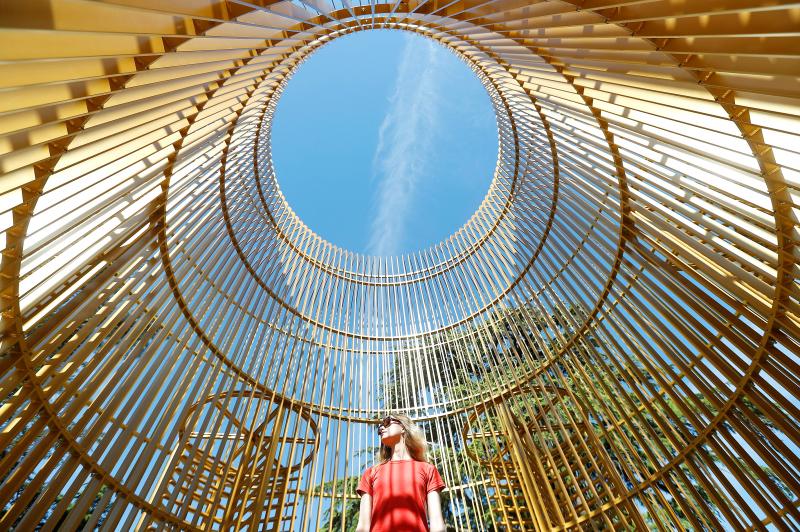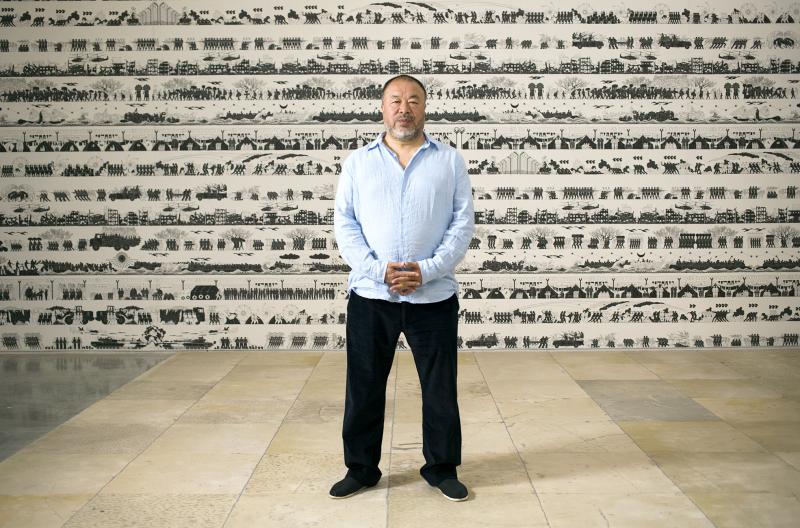From this week a seven-meter-high installation entitled Gilded Cage, by the exiled Chinese artist and human rights campaigner Ai Weiwei (艾未未), will be on display at Blenheim Palace in Oxfordshire. The piece, originally constructed for Central Park in New York in 2017, was made as a reflection on the worldwide refugee crisis. Ai, 64, is currently based in Lisbon. This conversation took place last week by phone.
Tim Adams: Tell me a little bit about Gilded Cage. How did it come about?

Photo: REUTERS
Ai Weiwei: I made it not long after I came out of China after four or five years of detention. I was researching migrants in Europe to make a film [Human Flow, 2017] and the Public Art Fund in New York City asked me to do a project. The golden cage was not far from Trump Tower, maybe three blocks away. It looks like a bird cage and it is double layered so that the audience can go into it and see how the world looks from there.
TA: Why have you chosen to put it at Blenheim Palace?
Ai: I had an exhibition there in 2014, [the inaugural annual contemporary exhibition]. At that time I couldn’t get out of China to see the show, but it was such an excitement for me. So this time when they asked to have the Gilded Cage, it recalled that show for me: it has the same kind of energy and the same humor and the same kind of commentary of the current political situation.

Photo: AP
TA: When you did the original show you made some references to Blenheim and its association with Winston Churchill. How interested were you in the specifics of that history?
Ai: I knew Churchill as a political figure and I know many people think he was very heroic in terms of ending the second world war, but of course there’s always argument about powerful political figures. For me, it was not really about one important historical individual, but rather to say we are living in a time when interpretation and judgment is changing.
TA: Blenheim gave a home to 400 evacuees during the war, but it is also a monument to an aristocratic and colonial past. How much of a student of English history have you been over the years?
Ai: Well, I’m still digging. When I was very young [during the Cultural Revolution in China], my family was sent to Xinjiang province. My father [who had been a famous poet, critical of Mao Zedong, 毛澤東] was made to clean public toilets. I remember, I was 10 years old maybe, he told me that Britain was a country where the sun never sets, because their colonies are 100 times bigger than the small island. So that was my first impression about Britain. But of course we are now in a very different world.
TA: There’s a debate here about public statuary and the associations with that colonial past. Do you think statues like those of Cecil Rhodes should be removed?
Ai: I think public statues are like a seal, or some mark on history. We have to respect our memory, but learn from our mistakes. Removing statues is something to me like talking about a man having a facelift as he gets older; you know, you think you want to make changes but they are not necessarily for the better. The debate is interesting, but not logical. If you follow [its argument], most buildings would be destroyed because they all come from that colonial time.
TA: There was some opposition, I understand, to the installation of your cage at Blenheim, from Historic England, who argued that it was “at odds with the visual character” of the Grade I-listed site. Did you get involved in that argument at all?
Ai: I don’t want to go into detail about it, partly because art is always there for people to interpret in the way they want to. I welcome how Britain has a lot of arguments about art.
TA: You see our so-called “culture wars” as a sign of a healthy democracy?
Ai: It’s not only democracy, it’s about art as symbols of our existence. You know, whenever we talk about democracy, we’re never talking about a perfect state, but rather continuous questioning and argument. [Public monuments] are about us, about those questions, not about any authority.
TA: The pandemic has obviously heightened all of those questions about authority across the world. I was watching Coronation [Ai’s recent, extraordinary documentary, filmed by eyewitnesses, about the first months of lockdown in Wuhan]. As well as being a powerful piece of factual film-making it feels almost like a prophecy or a warning of a more dystopian future…
Ai: That was my intention. You can view the film from a historical point of view, but it also examines how China functions. We still don’t even know where this virus comes from — that is very unnerving.
TA: What did you make of those reports in the press in the last couple of days from American intelligence that doctors at the Institute of Virology in Wuhan were hospitalized in November 2019?
Ai: I think anybody who is reasonably intelligent can understand that the pandemic has something to do with the Institute in Wuhan [the institute strongly denies any such link and none has been proved]. They have been talking for years about how they have separated these various kinds of viruses there. In China there are less philosophical or moral questions about how far humans can go into this kind of research. They want to be advanced. And not just China. Everybody also now knows that some money for that center comes directly from the US. China is not China now. They are connected in every way with US and the West. Not just in the economy and banking but in universities and research, everything.
TA: You must have been dismayed, but perhaps not surprised, that big platforms, Amazon or Netflix, didn’t choose to feature or carry your Wuhan film.
Ai: I’m not surprised. All the companies in the west, they have the same conclusion. You know, this is not about China for them, just profit-seeking. Why should they upset China if they want to make money?
TA: It was extraordinary watching some of the footage from Wuhan — from inside hospitals and sealed-off parts of the city. How did you get that film, and were there any repercussions for the people who shot it?
Ai: I know a kind of network of people there who might be able to do this, and as soon as the pandemic began, I contacted them and said: “You have to be staying in the hospital as a patient, or something.” They used their iPhones to film. You know, China’s very strange: it is hard to break in there, but once you are inside, behind the mask, it’s often OK to film.
TA: Still, I’m assuming your film has not been available in China?
Ai: No, of course, you cannot even mention my name there. But I’ll tell you an interesting story. The secret police have been sometimes contacting my mom, who is 88 years old. They do it just to let her know that they are watching her. When Coronation came out they told her “your son has really made a huge problem”, the words they use translate as “he has broken the sky”, because I talked about the pandemic. My mom was very worried, of course. I contacted the security police to see if they would watch the film. I sent the link. I get a note back saying “Weiwei, you did a beautiful film. Your film reflects the situation here. You did an honest film.” That was surprising for me, shocking. But then in the west they think the film will disturb China. You know, the world today is very funny. Very complicated.

Jacques Poissant’s suffering stopped the day he asked his daughter if it would be “cowardly to ask to be helped to die.” The retired Canadian insurance adviser was 93, and “was wasting away” after a long battle with prostate cancer. “He no longer had any zest for life,” Josee Poissant said. Last year her mother made the same choice at 96 when she realized she would not be getting out of hospital. She died surrounded by her children and their partners listening to the music she loved. “She was at peace. She sang until she went to sleep.” Josee Poissant remembers it as a beautiful

March 2 to March 8 Gunfire rang out along the shore of the frontline island of Lieyu (烈嶼) on a foggy afternoon on March 7, 1987. By the time it was over, about 20 unarmed Vietnamese refugees — men, women, elderly and children — were dead. They were hastily buried, followed by decades of silence. Months later, opposition politicians and journalists tried to uncover what had happened, but conflicting accounts only deepened the confusion. One version suggested that government troops had mistakenly killed their own operatives attempting to return home from Vietnam. The military maintained that the

Before the last section of the round-the-island railway was electrified, one old blue train still chugged back and forth between Pingtung County’s Fangliao (枋寮) and Taitung (台東) stations once a day. It was so slow, was so hot (it had no air conditioning) and covered such a short distance, that the low fare still failed to attract many riders. This relic of the past was finally retired when the South Link Line was fully electrified on Dec. 23, 2020. A wave of nostalgia surrounded the termination of the Ordinary Train service, as these train carriages had been in use for decades

Lori Sepich smoked for years and sometimes skipped taking her blood pressure medicine. But she never thought she’d have a heart attack. The possibility “just wasn’t registering with me,” said the 64-year-old from Memphis, Tennessee, who suffered two of them 13 years apart. She’s far from alone. More than 60 million women in the US live with cardiovascular disease, which includes heart disease as well as stroke, heart failure and atrial fibrillation. And despite the myth that heart attacks mostly strike men, women are vulnerable too. Overall in the US, 1 in 5 women dies of cardiovascular disease each year, 37,000 of them